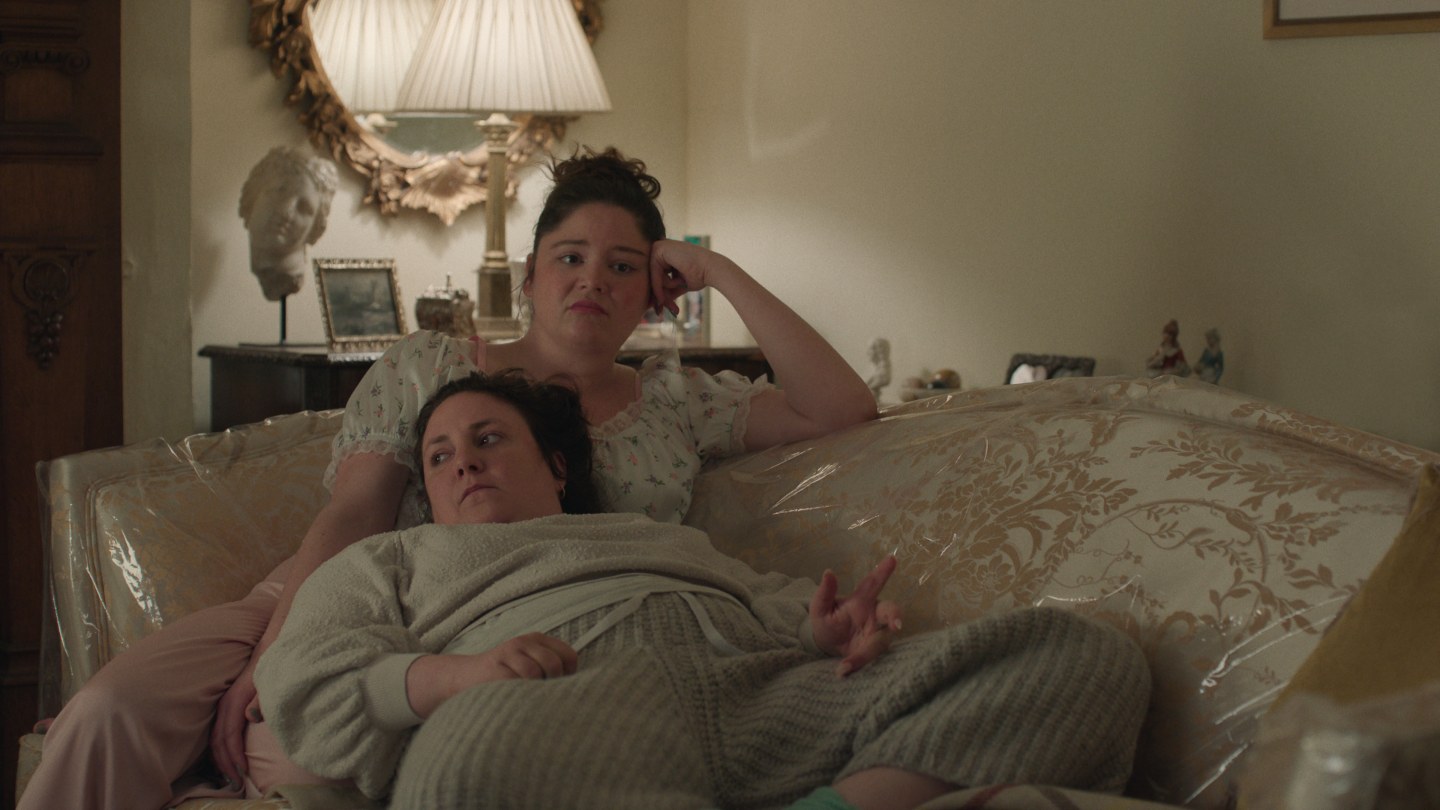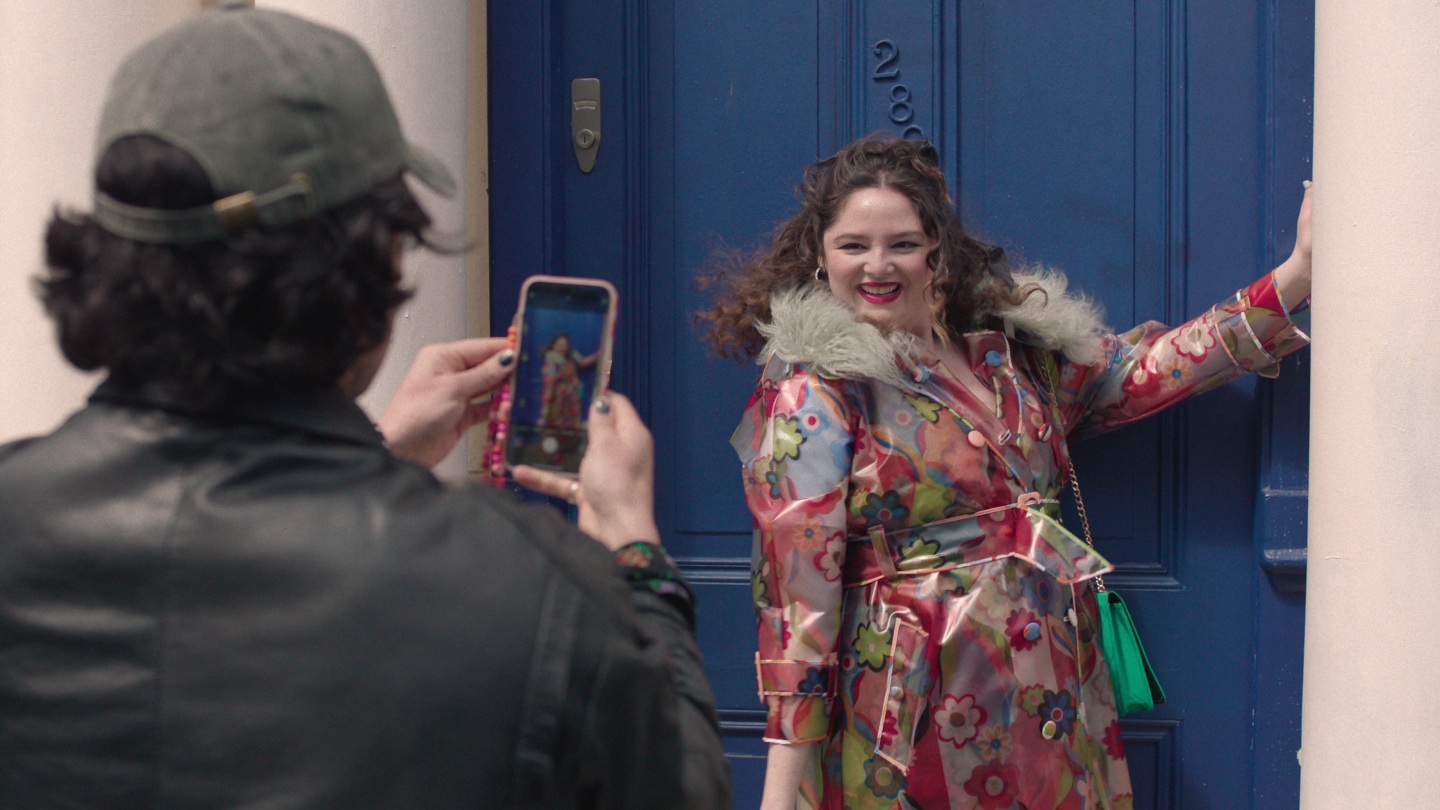Too Much review: Lena Dunham’s love life makes for an endearing Netflix rom-com”>
Netflix
Too Much begins with a break-up. Not a romantic one, though that is the catalyst. But a geographic one. Aspiring director Jess (Megan Stalter) flees New York and moves to London, dreaming of sprawling country estates, cups of tea, and a Four Weddings…-style romance. This is rudely shattered when she discovers that the reality of Britain is more grotty toilets and listening to a neighbor’s arguments through the walls of a high-rise tower block.
Jess finds some form of salvation in Felix (The White Lotus’s Will Sharpe), a musician she meets in a pub on her first night in the city. Felix is a bohemian dreamer, a squat-dwelling, climate-protesting, floppy fringed posh boy with a string of beautiful exes in love with him. Jess’s new work colleagues are not impressed: “An indie musician who plays at pubs? Throw a tuppence, you hit one of those,” one says dismissively.
 Too Much review: Lena Dunham’s love life makes for an endearing Netflix rom-com”>
Too Much review: Lena Dunham’s love life makes for an endearing Netflix rom-com”>
Netflix
Jess and Felix are the obvious facsimile of Too Much’s creators: writer and director Lena Dunham and her husband, Luis Felber. Dunham is forever etched in the millennial psyche as the voice of HBO’s Girls while Felber is lesser known to those without an encyclopedic knowledge of British guitar bands of the early 2000s. The couple met when Dunham moved to the U.K. to direct another HBO show, Industry, and they married in 2021. Their early dating life is captured on screen in a romantic blur of pubs, drugs, lots of sex, and Felix caring for Jess after she accidentally sets fire to her nightgown. The best episode of the whole series is about Jess and Felix staying up talking all night, even though she has sworn she needs to get an early night. It’s simple but really gets at that feeling of being in a new relationship, when even sleep feels like a wasted opportunity to spend more time together instead.
Too Much will be written and talked about through the lens of Dunham’s involvement — as it should since it’s her first major work of biography since Girls. But the show is much more a breakout vehicle for Megan Stalter. Already an IYKYK star across Instagram and as the hilarious Kayla in Hacks, Stalter, with her trademark humor, a kind of childish id in an adult’s body, thrives in her emotionally resonant portrayal of a semi-autobiographical Dunham finding love in her mid-30s. Being the star of a major Netflix show is one of the last-remaining and surefire star-maker moves, and in Too Much, Stalter is more than ready for her turn.
“Too Much will be written and talked about through the lens of Dunham’s involvement. But the show is much more a breakout vehicle for Megan Stalter.”
A layer to the show’s biographical nature is that it becomes a meta-commentary on the character’s real-life analogs. That’s most obvious around Jess’s New York ex. Zev is a good Jewish boy, played by Michael Zegan, who insults her looks and chastises her for being “too smart” to enjoy the Miley Cyrus song she is listening to. Anyone who’s followed celebrity gossip in the last decade knows Dunham was in a long-term relationship with producer Jack Antonoff before she left New York. Too Much by name, and at times by nature, reminds viewers of this, like in one particularly brutal scene soundtracked to Taylor Swift’s “Bigger Than The Whole Sky.” Another moment aims lower, with Jess remembering how his “cum tastes weird.” (Zev eventually dumps her for Instagram knitting influencer Wendy played by Emily Ratajkowski.) Too Much posits itself as a classic rom-com in the vein of Love Actually or Bridget Jones’s Diary but Dunham’s unvarnished honesty means there’s always thorns among the roses. These make for some of the show’s strongest moments, but they can also be distracting for people looking for a fluffier escapist adventure.
In contrast, Felix is Prince Charming (or, to stay consistent with Dunham’s clear Austen obsession, her Mr. Darcy). The show takes its title from Felix describing Jess as “too much”: “Just the right amount and a little bit more.” It’s validation for a character who spends her life squeezing herself into awkwardly fitting roles and having to temper her expectations of others.
 Too Much review: Lena Dunham’s love life makes for an endearing Netflix rom-com”>
Too Much review: Lena Dunham’s love life makes for an endearing Netflix rom-com”>
Netflix
Sharpe plays Felix with a dreaminess often only afforded to those from the most affluent of backgrounds, and Too Much dives into his privilege, unpicking the damage done to him by racist kids at school and by an emotionally distant father.
Like Girls, which was was famously hamstrung by its limited reflection of New York’s diversity, Too Much is also occupied with the elites. An early joke about “estate,” referring to both a lavish country abode and a residential area managed by the local authorities, is a little overplayed. A lot of time is also spent on Felix’s friend group, a group of rich kids he doesn’t even like and who hold Jess at a distance, presumably because they don’t know which private school she went to.
If the series has a fault, it’s this sprawling b-plot cast. Dunham herself plays Jess’s sister who lives on Long Island with their mom (Rita Wilson) and grandmother (Rhea Pearlman) in “an intergenerational Grey Gardens hell.” Andrew Rannells, another ex-Girls star, is the sister’s ex and father of her child. For a story that’s so London-centric, having this family drop in largely via video chat makes Too Much feel lumpy and uneven at times. In the U.K., Leo Reich is excellent as Jess’s phone-addicted Gen Z coworker, but a romantic plot between two other colleagues (Janicza Bravo and Daisy Bevan) feels undercooked and unfocused.That’s not to mention an additional throuple saga involving Richard E. Grant, the eccentric “lord of the manor” executive, and two lovers both named Cody.
Blame the bloat on the streaming economy. Too Much’s biggest concession to the British way of life could have been a tight six-episode season all about Jess and Felix. It’s their romance that forms the beating heart of this show. And like their early nights together, it’s the scenes with just these two that you don’t want to end.




